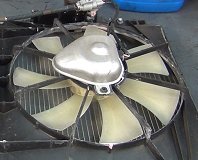A '73 model has a mechanical fuel pump on the passenger front corner of the engine. Electric pumps are used on newer models with fuel injection.
There's two things to consider if you're not getting fuel to the carburetor. The first is a mechanical pump may not be able to draw a prime unless the engine is running. This happens all the time to my '80 Volare, including after it sits for a few months. I have to pour gas down the carburetor, then run the engine on that, sometimes three or four times before the pump primes, then it will be fine as long as I restart the engine within a few days. My Volare has a six cylinder engine. Due to the design of the intake manifold, it's just about impossible to flood it, so I can get it to run well over five seconds on what is dumped into the carburetor each time. Don't get that carried away with a V-8.
The other concern is if there's a pinhole rusted in the fuel line or a rubber connecting hose is dry-rotted. That will make it easier for the fuel pump to pull in air instead of fuel from the tank. One way to check for that, if you don't already see wetness along the right frame rail, is to use a rag and an air nozzle to put the fuel tank under light pressure, then check underneath again. Do that at the gas cap. The rag will help prevent the pressure from going too high.
If you want to get more involved, remove the fuel supply hose at the pump, then fashion a hose that can be dropped into a container of gas. If the pump draws gas that way, a good suspect is a plugged pick-up sock, or screen, inside the gas tank. I had those plug on two carbureted cars, a '78 LeBaron wagon, and a different '80 Volare. Back in the '80s those only cost $3.00 from the dealer, but the gas tank has to be lowered to install them.
The most common symptom for a plugged sock is the engine will run fine for up to 15 miles, then it will starve for fuel and it's worse the faster you try to go. After sitting on the side of the road for a few minutes, the collapsed sock will expand and let fuel flow again for another couple of miles. The same thing can happen on fuel injected engines, but the symptoms are very different. This happened twice on my '88 Grand Caravan. The engine runs best, even without symptoms, at highway speed. It will stall when the highest volume of gas is being pumped, which is during coasting.
Is there any other history or symptoms that led up to this?
Saturday, February 11th, 2023 AT 2:29 PM


